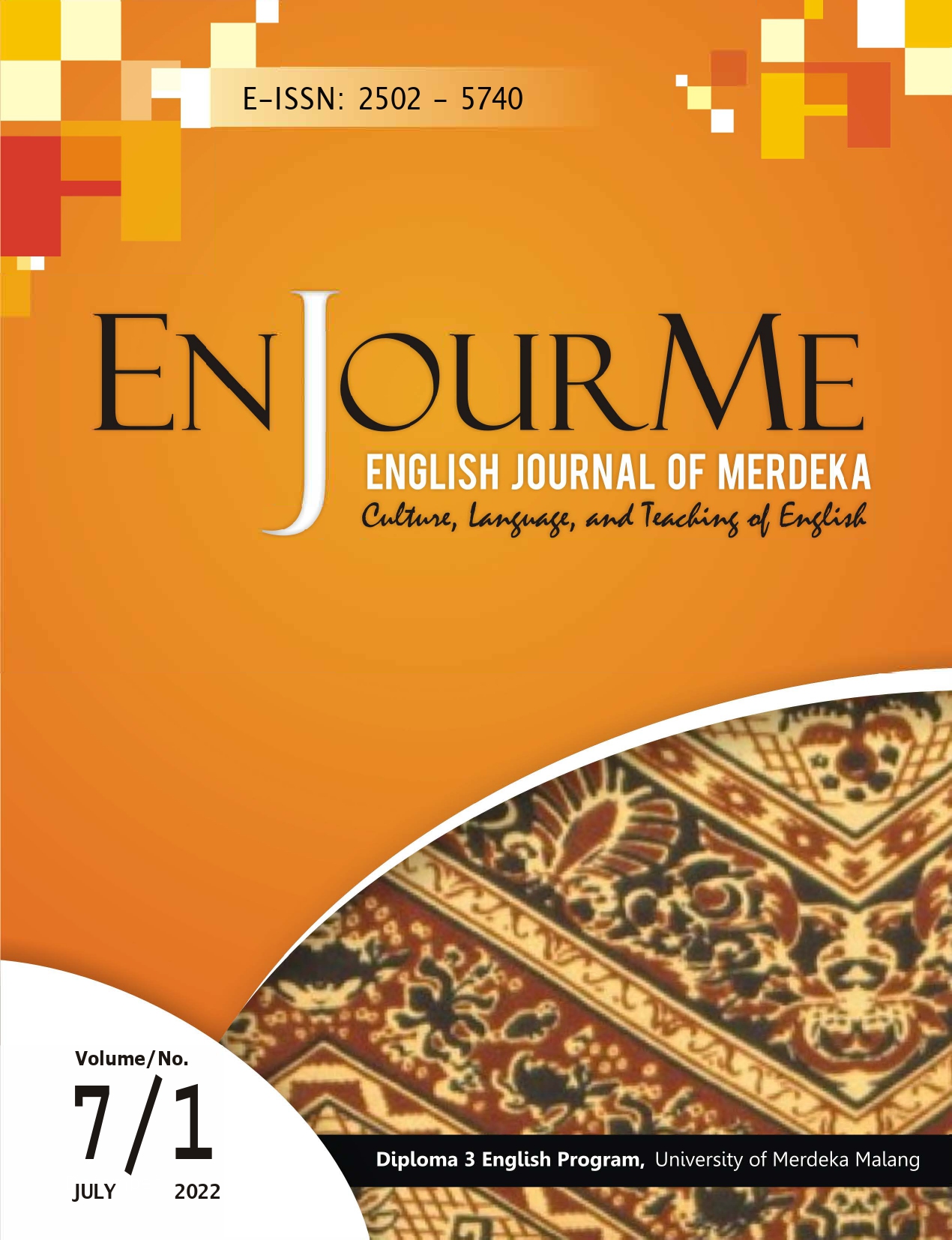Exploring the graduates’ perception of English language materials in Vocational High Schools
DOI:
https://doi.org/10.26905/enjourme.v7i1.7445Keywords:
EFL, ESP, Vocational High SchoolAbstract
Instead of continuing their studies, Vocational High School (SMK) students are prepared to work following graduation. Thus, instead of using general English, ESP (English for Specific Purposes) should be integrated in SMK. However, the Indonesian National Curriculum decided to teach both SMA (General High School) and SMK the same general English content. The purpose of this study is to see how graduates feel about the EFL materials they received at SMK. This research involved three SMK graduates as participants. This investigation yielded three recommendations. First, ESP resources should be incorporated to the English topic in SMK without omitting the need for general English materials. Second, SMK classroom activities should place a greater emphasis on practical communication. Third, extensive reading and/or listening activities should be implemented in SMK.
DOI:Â 10.26905/enjourme.v7i1.7445
Downloads
References
Afendi, A., Munir, A., & setiawan, S. (2020). Facilitating student behavioral engagement in ESP classroom through teachers’ scaffolding talk. EnJourMe (English Journal of Merdeka) : Culture, Language, and Teaching of English, 5(1), 41–53. doi:https://doi.org/10.26905/enjourme.v5i1.4264
Ardinal, B. T., & Anwar, D. (2021). An analysis of ESP syllabus at Vocational High School Nusatama Padang based on needs analysis result. Eighth International Conference on English Language and Teaching (ICOELT-8 2020) (pp. 207-211). Atlantis Press.
Cahyati, S. S., Cynantia, R., & Rizkiani, S. (2015). Analisis kebutuhan siswa dalam materi buku teks Bahasa Inggris tingkat SMK. Jurnal Ilmiah P2M STKIP Siliwangi, 2(2), 209-216.
Chan, C. S. C. (2021). University graduates’ transition into the workplace: How they learn to use English for work and cope with language-related challenges. System, 100, 102530. https://doi.org/10.1016/j.system.2021.102530
Diniah, S. N. (2013). Teacher’s perceptions towards the use of English textbook in EFL classroom. Journal of English and Education, 1(2), 72-81.
Haryanti, S. (2019). A need analysis of ESP syllabus design for accounting program at Vocational High School Negeri 1 Wonosobo in the academic year of 2018/2019. ELTiC CONFERENCE (Vol. 4, No. 1).
Iftanti, E. (2012). A survey of the English reading habits of EFL students in Indonesia. Teflin Journal, 23(2), 149-164.
Kennedy, C. (1983). An ESP approach to EFL/ESL teacher training. The ESP Journal, 2(1), 73–85. https://doi.org/10.1016/0272-2380(83)90024-0
Lailiyah, M., & Putra, S. P. (2022). Integrating the use of social media for group collaboration in ESP classroom. English Teaching Journal: A Journal of English Literature, Language and Education, 10(1), 60–66. https://doi.org/https://doi.org/10.11591/etj.v10i1.11716
Mathew, B., Maity, S. K., Goyal, P., & Mukherjee, A. (2020). Competing topic naming conventions in quora. Proceedings of the 7th ACM IKDD CoDS and 25th COMAD. http://dx.doi.org/10.1145/3371158.3371173
Medrea, N., & Rus, D. (2012). Challenges in teaching ESP: Teaching resources and students’ needs. Procedia Economics and Finance, 3, 1165–1169. https://doi.org/10.1016/s2212-5671(12)00291-2
Mentari, P. Y. (2019). A need analysis of ESP for office administration program at Vocational High School Negeri 2 Purworejo in the academic year of 2018/2019. Journal of English Education and Teaching, 3(4), 470-480.
Nur, M. R., & Madkur, A. (2014). Teachers’ voices on the 2013 curriculum for English instructional activities. IJEE (Indonesian Journal of English Education), 1(2), 119-134.
Ratnadewi, D. (2016). Pembelajaran Bahasa Inggris tematik integratif: Sebuah alternatif model pembelajaran Bahasa Inggris di Vocational High School. Didaktis: Jurnal Pendidikan dan Ilmu Pengetahuan, 9(2).
Sukarni, S. (2020). Understanding learners’ need of ESP for accountancy program at Vocational School. English Review: Journal of English Education, 8(2), 273-282.
Tyas, P. A., & Safitri, M. (2019). An analysis of English textbook entitled "Bahasa Inggris SMA/MA/SMK /MAK Kelas X". JEES (Journal of English Educators Society), 4(1), 17-22.
Additional Files
Published
How to Cite
Issue
Section
License
Authors who publish with this journal agree to the following terms:
(1) Copyright of the published articles will be transferred to the journal as the publisher of the manuscripts. Therefore, the author confirms that the copyright has been managed by the journal.
(2) Publisher of EnJourMe (English Journal of Merdeka) : Culture, Language, and Teaching of English is University of Merdeka Malang.
(3) The copyright follows Creative Commons Attribution–ShareAlike License (CC BY SA): This license allows to Share — copy and redistribute the material in any medium or format, Adapt — remix, transform, and build upon the material, for any purpose, even commercially.




